There has been a lot of discussion recently on whether or not Google uses information from a site’s Better Business Bureau (BBB) profile in ranking decisions. I have maintained for some time now that a business’s BBB rating is important, so naturally, people have been asking me questions about this.
I decided to write this article with my thoughts.
First, let’s talk about why this discussion has come up today. Barry Schwartz reported that Google does not use BBB ratings in rankings:
Google confirms that they do not use BBB score/ratings or other 3rd party score in their search ranking algorithm https://t.co/AqOYODtFlx via @JohnMu and @glenngabe pic.twitter.com/LwWgAAnhcd
— Barry Schwartz (@rustybrick) November 14, 2018
This is based on a quote from John Mueller in a help hangout. John said, “I would venture to guess that you are correct that we wouldn't use something like the BBB score for something like this. As far as I know that's certainly the case.”
However, Google’s Quality Raters’ Guidelines (QRG) talk a lot about the BBB and third party review sites. So first, let’s talk about the role that the QRG likely play in Google’s algorithms. While there are some who believe that they have no relevance at all to how Google ranks sites, I would definitely disagree.
How the Quality Raters’ Guidelines are connected to Google’s algorithms
When Google first made the QRG available to the public to read, they announced this in a blog post. This post told us that the guidelines were created to help webmasters understand what it is that Google looks for in terms of quality.

Just recently, Ben Gomes, VP of Search at Google was interviewed on CNBC. He told us the following:

My view on the Quality Raters’ Guidelines is that they do not exactly reflect Google’s algorithms, but rather, they tell us what Google wants their algorithms to accomplish. I thoroughly believe that if something is listed as a sign of high or low quality in the QRG, then Google’s goal is to be able to algorithmically determine this.
What the QRG say about the BBB
The BBB is listed several times in the QRG. The quality raters are instructed to do searches on Google to try and find reputation information about a company.

The guidelines specifically say that if a business has a low rating on the BBB it usually means that there are a large number of unresolved complaints. They say, “Please consider very low ratings on the BBB site to be evidence for a negative reputation.”
Reputation is mentioned throughout the QRG as a sign of low quality. This section tells us that if extensive reputation research reveals even a mildly negative reputation, then it should be considered low quality.
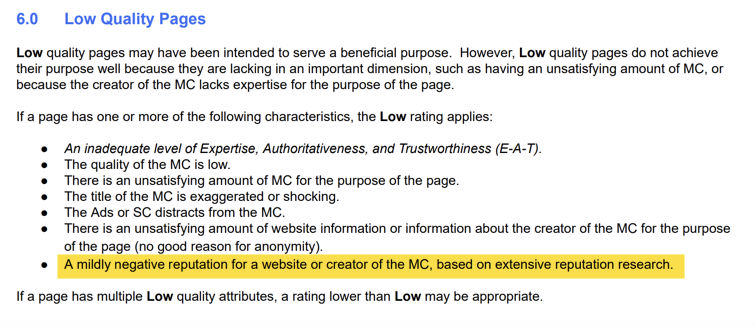
The guidelines also give some examples of businesses that are to be considered low quality and mention the BBB rating in their reasoning as to why.

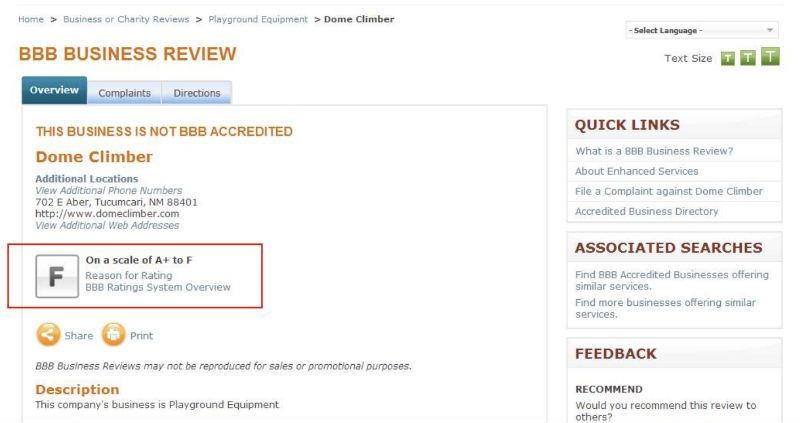


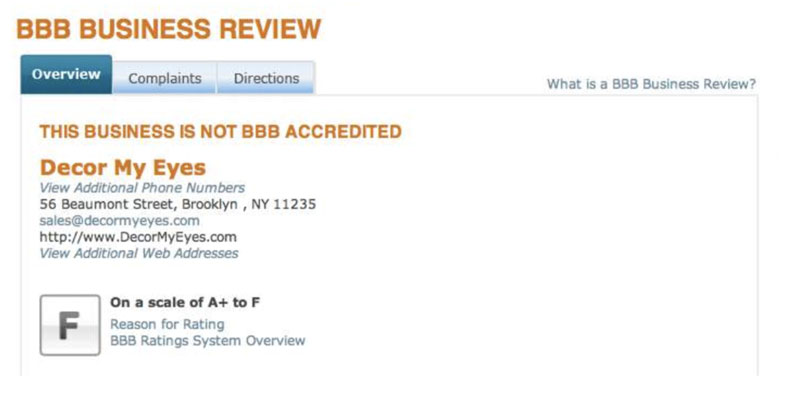
But is Google really using info from the BBB in the algorithm?
It doesn’t make sense for Google to rely on the information from a single third party website in order to determine the ranking of a business. In some countries the BBB doesn’t exist. In other places, a BBB listing could be attacked as a form of negative SEO through fake complaints.
Some have argued that the BBB could not be used in ranking decisions as it’s a paid service. However, the QRG do not specifically say that being accredited with the BBB is a ranking factor. Rather, they say that a very low rating is a sign of low quality. This has nothing to do with whether a business has paid for their BBB listing.
We do think that every business that can have a BBB listing should pay very close attention to that rating! In most cases, if your business has a low BBB rating, it means that the business has serious reputation issues. Google does not want to rank sites that have serious reputation issues.
In late July of 2018, Google made quite a few changes to the QRG. Two of these changes included adding the word “safety”.


Twelve days after this version of the guidelines was made publicly available, we had the massive August 1 (medic) update. I thoroughly believe that this update was Google’s first strong attempt at algorithmically determining which websites could potentially impact the safety of users. The goal here, in my opinion, was in part, to algorithmically determine Trust, the “T” in E-A-T (Expertise, Authoritativeness, and Trustworthiness).
One of the sites that saw massive drops was Dr. Axe’s site. Dr. Axe appears to have incredible E-A-T. He seems to be world renowned, has published books and is definitely known as an authority on his topics. Yet, the site saw incredible drops in traffic.
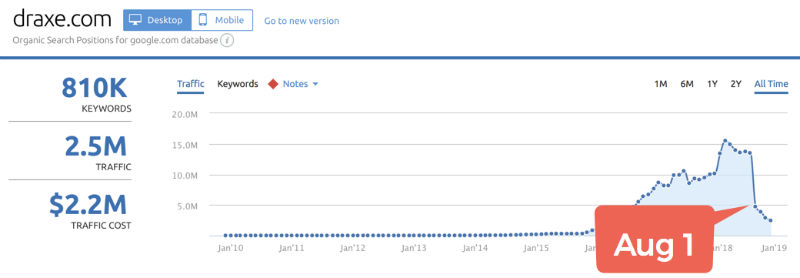
If Dr. Axe has great authority, why did this site drop?
One thing that we noticed is that his BBB profile not only had an F rating, but they also had a massive red banner that screamed out, “WARNING! DO NOT TRUST THIS COMPANY!”
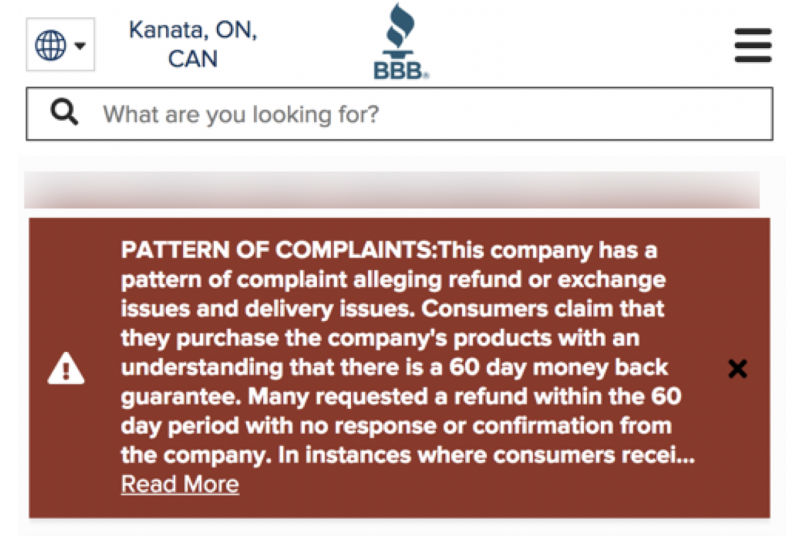
It is interesting to note that since I first took this screenshot (just a few days after the August 1 update), the profile on that page changed to say “This business profile is being updated.” It has since changed again and now points to a completely different profile for a company with a different name. The current BBB profile has an A rating, but has the following warning at the top:
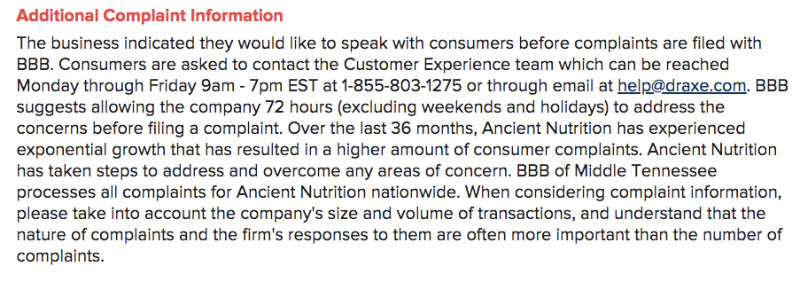
It looks like the Dr. Axe company is working hard to fix their BBB problems so that they can hopefully improve their rankings.
However, if you look at SEMRush’s estimates of traffic for the last few months, you can see that things are still trending downward.
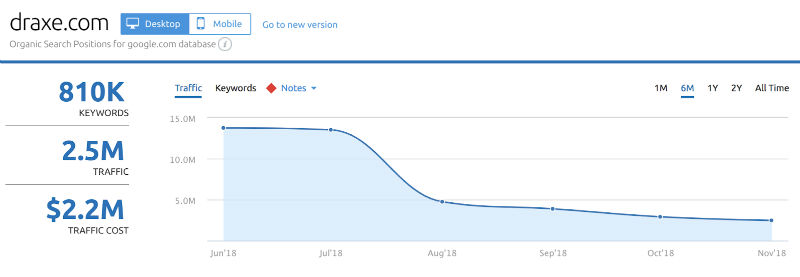
There are quite a few other examples as well of sites that saw big drops on August 1 that had similar BBB profiles.

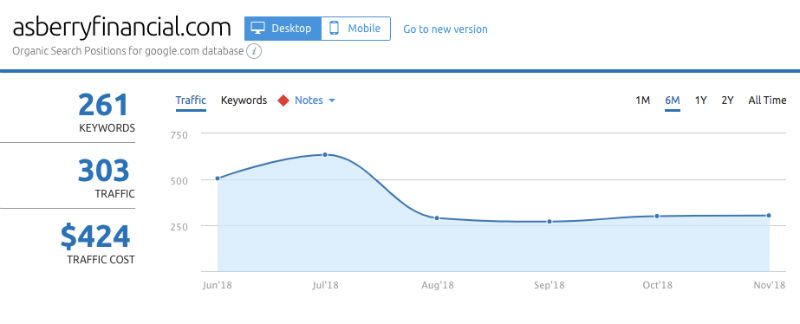

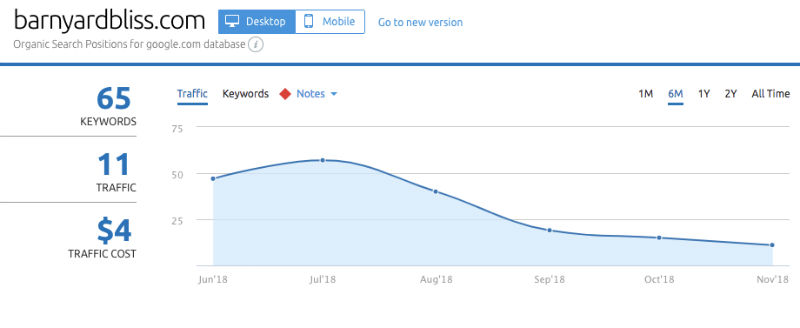

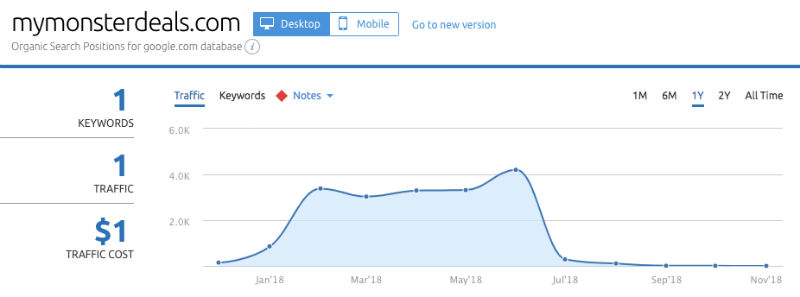
But, not every site that has this red warning saw drops. So what is going on here?
How I believe Google is using this information
I do not believe that Google has an algorithm that says, “IF BBB RATING = F, THEN QUALITY = LOW”. But, I do believe that they look at a large number of signals online to try and algorithmically demote businesses that could cause harm to users.
I wrote a very thorough post that describes a large number of factors that Google can use to algorithmically determine trust. These are all based on things that are outlined in the QRG.
In the same help hangout in which John Mueller mentioned that he does not believe that Google directly used BBB rating as a ranking factor, he said the following:
“There are various kind of issues with regards to some of these sources of information about a business, about a website and we need to make sure that we're really reflecting what we think is actually relevant for users. Rather than blindly relying on some third parties ratings.”
To me, this means that Google is likely gathering large amounts of information in order to determine whether a business is trustworthy or not. They likely don’t look at any of this information in isolation. For example, if a business has a bunch of complaints on the BBB, but there is very little other evidence online that there are problems, then a low BBB rating may not hurt them.
We believe that Google’s engineers are working hard to algorithmically determine trust. Then, they ask the Quality Raters to look at things like a business’s BBB profile and their negative reviews on review sites, etc. in order to give feedback on how good of a job the algorithm is doing.
My team and I had a great discussion today, theorizing on how Google could algorithmically determine trust without relying completely on third party sites. My team members Cassie and Callum came up with an interesting theory. I am not saying that this is for certain true, but it did really make me think.
What if Google used Chrome and Android data to determine what customers did after investigating a company’s reviews online? This of course, assumes that Google uses engagement data from Chrome, which is something we suspect but can’t prove.
If you look at Chrome’s privacy policy, you can see that they certainly do have access to information on how people engage with websites.

Whether or not Google truly uses user engagement data to help determine where to rank websites is a topic for a whole different article. But just for fun, let’s flesh this out.
Let’s say that I was deciding on whether or not to buy one of Dr. Axe’s products. A normal searcher would check quite a few reviews online. So, perhaps I looked at some Amazon reviews, the BBB profile and a few other review sites. After reading these reviews, I might think, “Hmmmm… a lot of people are complaining about this business. I don’t think I’ll buy from them.” And instead, perhaps I go and buy a different product somewhere else.
It’s a far fetched theory, but I think it’s theoretically possible that Google’s algorithms say, “The majority of time when people are searching for information on whether or not they can trust this business, they do not buy from them.”
I know… I know… many of you right now are debunking that theory. It certainly has holes. My point here is not to start an argument about whether Google uses user engagement data. Rather, the point that I am trying to raise though is that Google’s engineers are really really smart and likely have a lot of different ways to genuinely determine whether a business is trustworthy. Google has told us that the QRG reflect what they want their algorithms to do. The QRG are absolutely loaded with examples instructing the Quality Raters to look at review profiles, BBB ratings and other trust issues. It is clear that Google wants to algorithmically determine trust. What’s not clear is how they do it.
Conclusions
I still thoroughly believe that the algorithm changes that we have seen since August 1, 2018 reflect, amongst other things, Google’s attempts to demote businesses that have issues that would potentially harm users or cause customers not to trust them.
So, should you pay attention to your BBB profile? YES! In most cases if a business has a pattern of complaints, it means there is a serious problem with that business that absolutely must be addressed. As Google gets better and better at determining which businesses are trustworthy, it is going to get harder and harder to simply SEO a site to the top of the search results unless it truly is a great business.
We have done quite a few site quality reviews for businesses who saw drops in traffic following a recent quality update. In every case we could find significant issues outlined in my post on trust in the QRG.
The algorithms are by no means perfect. There are quite a few examples of sites that are ranking well that do not deserve to rank. But it is clear to me that Google is trying really hard to protect the safety of users and only rank trustworthy sites.
While I don’t think that Google uses a site’s BBB rating as a direct ranking signal, I am completely convinced that they use a large number of signals to determine which sites users can trust.
What do you think?
Do you think this theory is crazy? How do you think Google algorithmically determines trust? I would love to hear your thoughts below.
Sign up for my newsletter
If you want to stay up to date on the latest algorithm changes and more, you can sign up here.



Comments
If Dr.Axe isn’t virtually PROOF of everything you’re saying here, then none exists. And extremely poor reviews for their products, customer service and Dr. Axe’s actual medical services business are ALL OVER the internet. (Here’s a page that summarizes them: https://urbol.com/dr-axe-reviews/)
They can try to pay the BBB off to clean up their rating there but the customers are everywhere and you see the same pattern over and over again: dissatisfaction with products leading to refund requests going unfulfilled and in fact, the customer finding themself unwittingly on an autoship program that they can’t stop. Everything else that made draxe.com so strong is now irrelevant.
Really well-written Marie! As always, I love your articles. We also had a client who has not been doing great with some of the recent algo updates. His organic is declining but his local rankings are solid (so his call volume hasn’t dropped). We also saw that he had a BBB profile which didn’t even used to exist but someone created it when they submitted a complaint about him and he hasn’t responded to the complaint. We put this high on his task list to deal with because even if it doesn’t explain the ranking issues, we still don’t want his future customers possibly seeing a C- rating and the fact that he doesn’t respond to complaints.
Thanks so much Joy. The QRG do talk about complaints that are not responded to being a sign of low quality. Pushing them to respond is definitely a good idea!
I would say that Google is able to detect the overriding sentiment about an entity, be that a piece of content (positive/negative) or a company (good/bad).
They would be silly to base their data solely on the BBB, especially as people with a more personal blog/site like myself a not a “business” would never be featured on such a site.
If it were me, I would be searching the SERPS for “company name” -site:companyname.com and then analysing the sentiment from there.
So, I suspect the algo is more on the lines of IF $serp_sentiment “Good” Then $site_eat = “Low”;
Yup. That’s the kind of search we do in our reviews. We’re not looking to see that a site specifically has a good BBB rating, but rather, how well they stack up in terms of reputation as compared to competitors.
Hey Marie,
If E.A.T is so important how can you explain what I am seeing with
the website health24.com – it had a massive spike in traffic after August updates. But it has extremely low level content.
Most articles don’t have author. The about us is a joke.
There are plenty of other examples of “news” sites that suddenly became authority in everything that is health related.
It’s really hard to understand what these updates are all about when seeing such sites.
My team and I had a bit of a look at that site, and it really does look like it is indeed an authority. While there are certainly things to be improved upon, the authors look like they are experts in their field. They also have a lot of authoritative mentions.
BBB does influence your ranking, all digital data can influence reputation, therefore influence rank.
My “beef” is that the BBB is a farce. We (Previous employer) had a company that refused to communicate, nor pay the bill they agreed to in our contract. I contacted our local BBB and they put me through hell with all their forms and submissions and wait times, only to refuse to hamper the business rating, because they are a PAID member of the BBB. AND we were also a paid member!
We were not the first, nor the last I’m certain to have an issue with this company, their Google reviews effectively represent their lack of commitment to quality and service.
Ratings influencer, yes, a quality online reference the BBB is absolutely not.
Hi Marie,
It’s not that you have share this scope. I do believe that Google has lots of things to consider when it comes to ranking factor and BBB can be best source for trust signals. It’s awesome that you have shared a clear connection of BBB ratings on QRG.
There’s no BBB outside the States 🙁 How can a non-American company improve E-A-T then?
When we review a company that is either in another country, or for whom competitors have no BBB listings, we look at the review sites that currently are dominating the space. The important point here is that Google is likely looking at quite a few sources to determine whether a business has reputation issues.
That was my question – what are the “few sources”, say, for a UK or Australian company?
It really depends on your niche. What I’d do is do a search for your main keywords and see which sites are ranking well. Then, search for reviews for that company like this:
companyname.com reviews -site:companyname
company name reviews -site:companyname
If all of your competitors are getting reviews on say, TrustPilot, then you should too.
I have firsthand knowledge that this statement is based on a mistaken premise. “a BBB listing could be attacked as a form of negative SEO through fake complaints.” “fake complaints” are not possible because complaints are always vetted and a consumer would need proof of doing business with a company before BBB would process a complaint. Even reviews at BBB are handled by real people and not automatically posted and there proof of a “business interaction” is required or the review does not get posted. Bottom line the BBB Complaint and Review system is the real deal.
Great Article Marie,
This really sparks off another question, do you think there is a relationship between a BBB rating and the T in E-A-T?.
Buzzing around my mind just now is a low BBB rating = A Lack of trust and BBB rating has some effect on where google are trying to take search with their algorithm and Quality Rathers Guidelines.
This article was really well researched and I learned a lot from it. Lots of pros and cons pointed on “advertising” with the BBB.